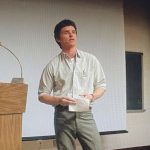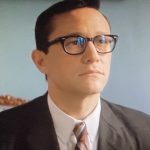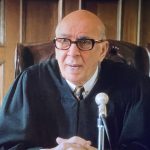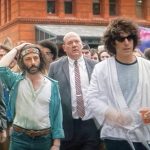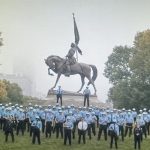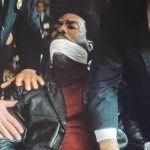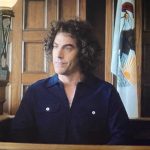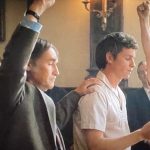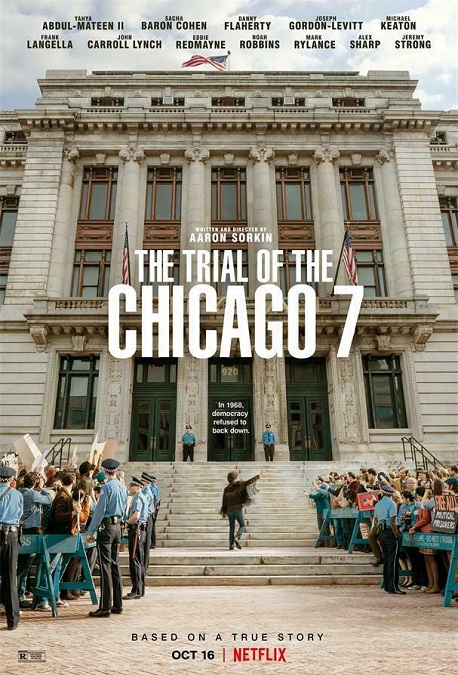



The Trial of the Chicago 7 – 2020-21
This was a good movie, but not a great one. It was certainly worth seeing, but my research revealed that it was only about 80% historically accurate. At times, the pacing was a little slow, but only in a few scenes. As for the caliber of the acting, most of it was very good, though in a few cases, it was phenomenal. The story was relevant to our troubled modern times, though the narrative was noticeably slanted toward a specific point of view. That, in itself isn’t necessarily a bad thing. Movies based on true event nearly always do that. But think about how much better it might have been if it had been impartial, and told the story from different points of view with honesty and boldness.
The movie follows the trial, which started out to have eight defendants, but was historically recorded as seven, after one of them was found to be ultimately unconnected with the case. The seven men charged with inciting the Grant Park Riot were Tom Hayden, played by Eddie Redmayne, Abbie Hoffman, played by Sacha Baron Cohen, Rennie Davis, played by Alex Sharp, Jerry Ruben, played by Jeremy Strong, David Dellinger, played by John Carroll Lynch, Lee Weiner, played by Noah Robbins, and John Froins, played by Daniel Flaherty. The eighth defendant was Bobby Seale, played by Yahya Abdul-Mateen II. Other notable actors in important roles were Joseph Gordon-Levitt, playing the Assistant Federal Prosecutor, Richard Schultz, Michael Keaton, playing the former US Attorney General, Ramsey Clark, Mark Rylance as the defense attorney, William Kunstler, and finally Frank Langella playing the trial’s judge, Julius Hoffman. Whew!
I thought the plot of the film was pretty straight forward, with no major twists or upsets. Everything happened as you might expect with a lackluster ending that attempted to make the viewer’s heart swell with sympathy and patriotism for soldiers who died in the Vietnam War. I feel like they were trying to be inspirational, but I wasn’t really feeling it. I though it felt a bit forced.
Of the actors who really stood out to me, one was no surprise, and the other was a complete surprise. Frank Langella, played the mean, self-righteous judge who treated people with racism and contempt, while claiming fairness and impartiality. However, his clear prejudices and the way he completely dismissed the rights of the defendants, made the trial a ridiculous mockery. But ever the skilled actor, Langella pulled it off as both believable and powerful. I’ve never seen him turn in a bad performance, and this was no exception.
But the one who really surprised me was Sacha Baron Cohen. The few movies I’ve seen him in have not impressed me much. But here, I felt like he had risen above the obnoxious comedy of his Borat character, and even above the vaguely ridiculous character of the Police Inspector in Hugo. Here he gave us a very serious and intelligent portrayal of a real person with a sharp mind and a passionate soul. I was impressed, and will have to look at his acting with a little more credibility. He certainly caught my attention in a good way!
When movies change historical events or motivations to enhance the drama, I’m not bothered, as long as the changes don’t veer too far away from the truth. So, what were the major historical inaccuracies that bothered me? First, there was way the narrative constantly depicts the police as the bad guys. They are portrayed as the instigators of the famous Grant Park Riot. They are shown beating protestors with no cause, arresting them without reason. In reality, yes, that did happen, but the protesters were not blameless. They instigated just as much violence, and the police sustained just as many, if not more, injuries than the protesters.
Then there was the way Bobby Seale was portrayed. They made him out to be a completely innocent black man who was treated ridiculously unfairly because of pure racism, but in reality, a lot of his true story was left out. When he was bound and gagged at the trial, it lasted for three days, because he was constantly trying to escape his bonds and disrupt the trial with his outbursts. And I was shocked to learn that the real Bobby Seale was quoted as saying to the crowd of 2000 angry protestors “If a pig comes up to us and starts swingin’ a billy club and you check around and see you got your piece, you gotta down that pig in defense of yourself. … Because if you pull it out and shoot it well, all I’m gonna do is pat you on the back and say, ‘Keep shooting.’” It’s hard to think of him as completely innocent.
It may sound like I didn’t enjoy the film, but in reality, I did. It was entertaining, and had some really good performances. And it showed me a bit of history of which I had been unaware, even as distorted as bits of it were. Jerry Ruben never tried to save a woman from sexual assault at the riot. It’s just that with Aaron Sorkin at the helm as both the writer and director, I expected a little more wit, and a little more truth. I think it was worth watching, but it is also worth doing a bit of reading to find out what the real characters’ true motivations and actions were. I suppose they were just trying to make the narrative more dramatic, though I think reality would have been dramatic enough.
